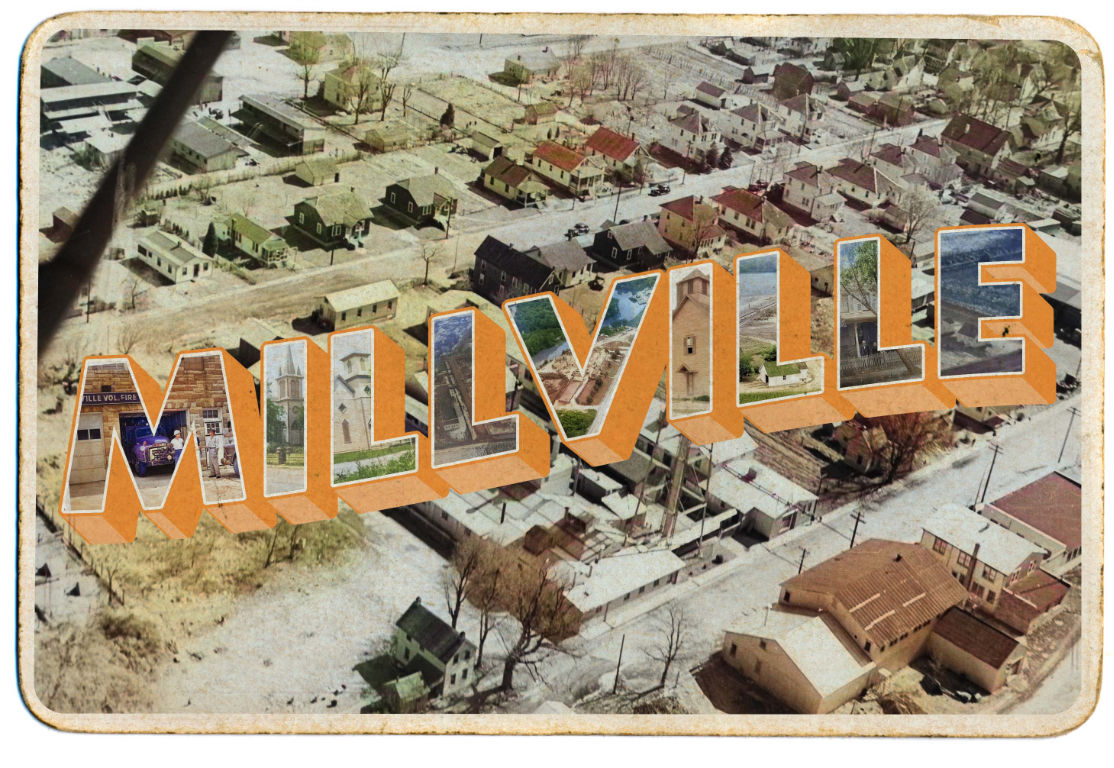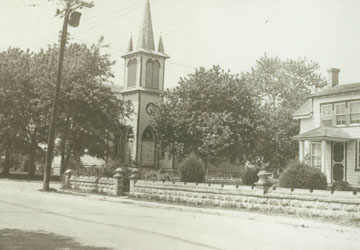


Located in the southeast quadrant of Sussex County, in an area that once contained a great deal of marsh and swamps, Millville is one of several towns along a ridge of high ground in this part of the state. A sawmill, established near the headwaters of Mill Creek in the late nineteenth century, formed the nucleus of the Town. Unlike other small communities which had reliable ways to ship goods, shipping from Millville presented many challenges. Coupled with poor roads in the area, and a railroad which charged exorbitant high rates for shipping goods out of market, commerce was limited. The result was very slow growth until well into the twentieth century. The popularity of Delaware’s beaches as a tourist destination has caused Millville to grow exponentially in the last fifty years.
The Town was incorporated in 1907 as the “Commissioners of Millville.” It was to be surveyed and the plot recorded with Sussex County. Elections were to be held for three Commissioners, an Alderman, an Assessor, and a Treasurer, all of whom were to be freeholders of the Town. Electors were required to be male, 21 or over, and taxable of the Town. One of the Commissioners was to be chosen to serve as President and another as Secretary, and they were to meet monthly to carry out the Town’s business. The Commissioners were to appoint Constables to assist the Alderman in keeping the peace. In addition to overseeing the opening of streets and their maintenance (with $200 annually provided by the Levy Court of Sussex County), the Commissioners were to pass ordinances that were deemed necessary for the government of the Town which could include directing the paving of footpaths (with costs of which were to be borne by property owners), regulating the making of gutters and placing of gutter stones, providing sanitary measures for the health of the citizens, preventing the introduction of infectious diseases, removing obstructions from the Town’s streets, abating nuisances, controlling the storage of gunpowder, suppressing the firing of guns and letting off of fireworks, and regulating and licensing shows and amusements. The Town could place a lien on property when residents were delinquent in paying their debts. They were also given the power to levy a per capita tax on white male citizens over the age of 21.1
It would be almost 100 years before the Town was re-incorporated, but there would be only a few amendments made to the 1907 Incorporating Act. In the same year as the Town was incorporated, a separate law was approved authorizing the Town’s Commissioners to borrow $1,000 with which to improve its streets. The action required approval by referendum and repayment of the bonds was to be ensured through a special tax.2 Two years later, the first extension of the Town’s boundary was approved.3 The next amendment to the Incorporating Act was not passed until 1961 when it was determined that the Justice of the Peace located in the nearest town could act as the Town’s Alderman.4 In 1994, the Town’s corporate limits were again expanded by the addition of two tracts. At the same time, procedures were adopted for annexing land.5
In the year 2000, Millville was re-incorporated, and a Charter established. The Charter noted that the Town boundaries consisted of four tracts, the original tract surveyed in 1908, the first addition in 1909, and the two tracts added in 1994. The procedures for annexing territory, as approved in 1994, were now included in the Charter. The election procedures are outlined. These procedures follow those generally accepted in the State of Delaware with electors being all those 18 and over. The government of the Town is now vested in a five-member Town Council, each serving a two-year term. The Council members are to choose members to serve as Mayor, Deputy Mayor, Secretary, and Treasurer. Meetings of the Council are to be held monthly. The Town Council appoints a Town Manager who is the Town’s Chief Administrative Officer, a Town Solicitor, a Board of Assessment, and optionally, a Board of Health and a Police Force. The Charter contains an enumeration of the Town’s powers. In addition to those already included in the original Incorporating Act, these included providing clean water, providing a sewer system, providing access to electric current and gas, controlling the Town’s drainage, granting franchises to businesses in the best interest of the municipality, enforcing a building code and zoning requirements, maintaining Town offices and a jail, licensing businesses and collecting fees for services, and providing for the organization of a fire department and ambulance service which are to receive funding from the Town annually. Yearly, the Town carries out an assessment of all real estate and improvements, and all Town citizens over the age of 18. They are also allowed to carry out supplemental assessments and also to assess a tax on all transfers of real property as well as all telephone and power poles and pipelines or rail lines. In addition, property may be sold to settle liens for delinquency in paying taxes. The maximum amount of taxation in the Town yearly is $250,000. They can also borrow money for municipal purposes, secured by bonds, in an amount not to exceed, in aggregate, 25% of the appraised value of the Town’s real estate; and can borrow up to $50,000 for immediate needs, secured by promissory notes.6
Although the Town has not been re-incorporated since the year 2000, there have been several amendments to the Charter. The first of these was in 2004 when the borrowing power for immediate needs was increased to $500,000 with a repayment time frame that doubled from ten to twenty years.7 Two years later, the Town was authorized to charge impact fees when there was new development or major construction so that they could recover the costs of improving or expanding municipal services.8 In 2008, an amendment authorized Millville to provide for Municipal Tax Increment Financing and Special Development Districts and Financing.9 In 2009, a piece of land which was part of the Lord Baltimore School District was de-annexed from Millville so that it could be annexed into Ocean View.10 In 2011, the maximum yearly taxation for the Town was capped at 3% of the total assessed value of real estate.11 In 2014, the Charter was amended by revising the terms under which the Town Manager position could be terminated.12 A law passed in 2016 made a number of changes to the Charter, the most significant of which were eliminating from the Charter the specific metes and bounds of the four parcels which made up the Town and instead referencing the plot in the Sussex County Recorder of Deeds office, changing the minimum age to qualify to hold an elected office in the Town from 18 to 21, eliminating the requirement that Council meetings be held at least monthly, replacing this with statement which indicated that they should be held regularly, and increasing the percentage of the Town’s budget that could be authorized for allocation to the fire department and ambulance services annually from 3% to 6%.13
For the fully amended text of the current Charter, see http://www.charters.delaware.gov/millville.shtml
CITATIONS in Del. Laws
1 24 Del. Laws, c. 217 (1907) [pp. 871-87]
2 24 Del. Laws, c. 218 (1907) [pp. 588-90]
3 25 Del. Laws, c. 204 (1909) [pp. 447-48]
4 53 Del. Laws, c. 70 (1961) [p. 184]
5 69 Del. Laws, c. 194 (1994) [pp. 420-25]
6 72 Del. Laws, c. 278 (2000) [pp. 503-26]
7 74 Del. Laws, c. 240 (2004) [p. 545]
8 75 Del. Laws, c. 441 (2006) [p. 597]
9 76 Del. Laws, c. 189 (2008) [vol. II, p. 10]
10 77 Del. Laws, c. 3 and c. 5 (2009) [p. 5 and pp. 7-8]
11 78 Del. Laws, c. 163 (2011) [http://delcode.delaware.gov/sessionlaws/ga146/chp163.shtml]
12 79 Del. Laws, c. 192 (2014) [http://delcode.delaware.gov/sessionlaws/ga147/chp192.shtml]
13 80 Del. Laws, c. 267 (2016) [http://delcode.delaware.gov/sessionlaws/ga148/chp267.shtml]
Delaware Laws from 1935 to present can be found online at http://delcode.delaware.gov/sessionlaws/
Town of Millville records at the Delaware Public Archives include:
jnl / September 7, 2018 | April 23, 2019